Adblocker Detected

We always struggled to serve you with the best online calculations, thus, there's a humble request to either disable the AD blocker or go with premium plans to use the AD-Free version for calculators.
Disable your Adblocker and refresh your web page 😊
Table of Content
This free online polygon calculator is exclusively programmed to calculate each and every petite parameter that is associated with the regular polygon. Before we move ahead, let it be clear that you need to go through a complete conceptual background to analyze this particular geometrical figure.
For a better understanding, Give A Go!
In geometry:
“A two-dimensional (2D) shape having straight lines connected to each other at particular angles is termed a polygon”
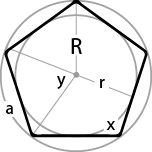
Where:
R = circumradius
r = inradius
a = side lengths
n = number of sides
x = interior angle
y = exterior angle
A = area
P = perimeter
Our polygon calculator finds all these values based on only one value provided.
Depending upon the sides and vertices of the polygon, we have its following types:
Trigon:
A polygon having three vertices is known as the trigon or simply triangle.
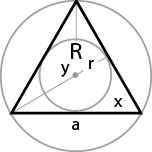
Feel free to calculate all the details of the trigon with the help of the online trigon calculator.
Tetragon:
A simple regular polygon having four vertices is known as the tetragon or simply square.
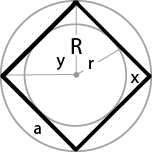
Use our free online tetragon area calculator to determine the area of the tertaragon and all rest parameters associated with it instantly.
Pentagon:
A polygon having five vertices is termed the pentagon.

Go for using a pentagon calculator if it feels difficult to enumerate all its terms thoroughly.
Hexagon:
A polygon made up from six sides connected to form a loop is called the hexagon.
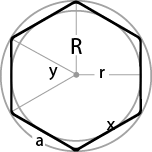
Our free hexagon area calculator will allow you to determine the factors of a regular hexagon in a short span of time.
Heptagon:
A closed loop designed using seven sides at particular angles is known as the heptagon.
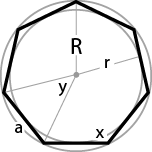
This free online heptagon area calculator swiftly solves for all the elements that are constituted to form a heptagon.
Octagon:
A regular polygon consisting of eight sides is known as octagon.
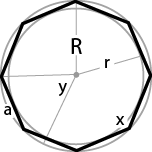
This free heptagon calculator assists you to figure out all the key features of a regular heptagon instantly and precisely.
Nonagon:
A polygon that is constructed using nine equal sides is called the nonagon.
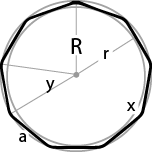
Make a use of the online nonagon calculator to investigate this figure properly.
Decagon:
A particular polygon that comprises ten sides is termed the decagon.
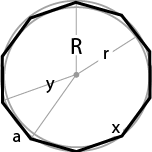
Our online decagon area calculator provides a smooth approach for measuring various details that are tied with the decagon.
Undecagon:
A polygon having eleven sides is known as the undecagon.
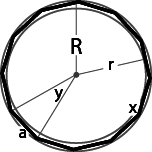
Make use of this free online undecagon calculator to better predict all the terms included in this geometrical figure.
Dodecagon:
A regular polygon that is constructed by using twelve sides is known as the dodecagon.
.png)
Make a use of this dodecagon area calculator to completely quantify various items associated with the dodecagon.
Tridecagon:
A closed loop comprising thirteen sides joined to form its particular angles is known as the tridecagon.
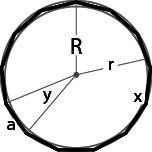
Go for using an online tridecagon calculator to enumerate all the factors wrapped in this polygon.
Tetradecagon:
When a polygon is designed by using fourteen sides, then it is named as a tetradecagon.
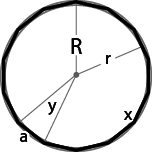
You can use our free online tetradecagon area calculator to swiftly calculate each and every single parameter linked with the tetradecagon.
Although, you can make a selection of free area of a polygon calculator to quickly solve for the outputs corresponding to polygons. But it is also very necessary to have a hands on grip on the manual computations as well. Here we will be discussing various basic formulas to completely solve for polygon.
Side length a:
$$ a = 2r tan\left(\frac{π}{n}\right) = 2R sin\left(\frac{π}{n}\right) $$
Inradius:
$$ r = \left(\frac{1}{2}\right) a cot\left(\frac{π}{n}\right) = R cos\left(\frac{π}{n}\right) $$
Circumradius:
$$ R = \left(\frac{1}{2}\right) a csc\left(\frac{π}{n}\right) = rsec\left(\frac{π}{n}\right) $$
Area:
$$ A = \left(\frac{1}{4}\right) na^{2} cot\left(\frac{π}{n}\right) = nr^{2}tan\left(\frac{π}{n}\right) $$
Perimeter:
$$ P = na $$
Interior Angle:
$$ x = \left(\left(n-2\right)\frac{π}{n}\right) Radians = \left(\frac{\left(n-2\right)}{n} * 180^\text{o}\right) $$
Exterior Angle:
$$ y = \left(\frac{2π}{n}\right) Radians = \left(\frac{360^\text{o}}{n}\right) Degrees $$
The free area of polygon calculator also measures the technical terms of a polygon by making use of all these formulas.
Here we will be solving an example to determine basic terms of the polygon. Let it be going:
Example:
How to find the area of a regular polygon and perimeter having 3 sides and side length of 3cm?
Solution:
As we know, a polygon having 3 sides is called a trigon.
Now we have:
$$ A = \left(\frac{1}{4}\right) *3*3^{2} cot(\left\frac{3.14}{3}\right) $$
$$ A = 6.75 * cot\left(\frac{3.14}{3}\right) $$
$$ A = 3.89cm^{2} $$
Now we have:
$$ P = na $$
$$ P = 3 * 3 $$
$$ P = 9cm $$
With this polygon area calculator, you can determine all key factors that are concerned with the polygon absolutely. Still wondering about how to use this free calculator? Do not worry as we will be guiding you to operate it. Let’s do it!
Input:
Output:
The free pentagon area calculator calculates:
You should always consider that a polygon has straight sides and is flat. So it should be kept in mind that the sides of the polygon are not curved. Second, regular polygons can have any number of sides.
No, as there is no straight line and vertices in a circle, it can never be called a polygon.
There are 11 vertices present in a hendecagon.
In a decagon, the sum of its interior angles is \(1440^\text{o}\).
No, an arch can be considered as half of the regular polygon.
Polygons allow students and professionals in their education to draw patterns and design different other geometrical shapes and learn their symmetry. In computer graphics, polygons are broadly used to sketch three-dimensional pictures. That is why it is very necessary to use a free perimeter of a polygon calculator to get optimum outputs regarding each and every parameter to make your calculations precise enough.
From the source of Wikipedia: Regular polygon, General properties, Regular convex polygons, Diagonals, Constructible polygon, Regular skew polygons, Regular star polygons
From the source of Khan Academy: Polygon types, Open and closed curves, Polygons as special curves
From the source of Lumen Learning: Histograms, Frequency Polygons, Constructing A Time Series Graph, Uses of a Time Series Graph